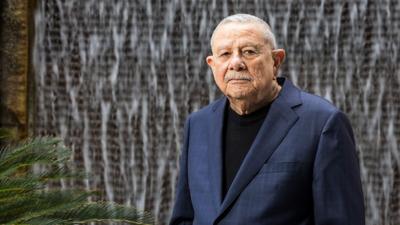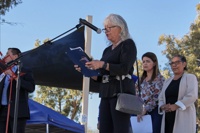
Alfredo Gutierrez. (ASU)
Alfredo Gutierrez, one of Arizona’s most prominent community and political leaders, died at the age of 79 on July 29 after a battle with esophageal cancer. He is considered a titan in Arizona through his activism, advocacy for underserved communities and leadership.
The son of a miner, Gutierrez was born in Miami, Arizona. He was elected senator in the Arizona State Legislature in 1972 after serving in the U.S. Army during the Vietnam War. He was 27 when he was elected and spent 14 years at the Legislature, but even before then, he had made a name for himself as an organizer in his home state.
Throughout his career both in politics and in community advocacy, Gutierrez was well-known for bringing the needs of the Latino and migrant communities to the forefront.
Gutierrez was a founding member of Chicanos Por La Causa (CPLC), Valle Del Sol and led the way for Arizona’s Department of Transportation (ADOT) and Medicaid program known as the Arizona Health Care Cost Containment System (AHCCCS).
Gutierrez also helped establish South Mountain Community College, where, as of 2023, nearly 60% of its students identified as Latino.
“All of that work, people still benefit from it,” Vianey Olivarría, executive director of CHISPA Arizona, told CALÓ News. “Alfredo would do it because he had a big heart, not because he expected gratitude from people.”
His passing was felt throughout the community, and many community and political leaders shared about his lasting impact.
“Alfredo was such a giant, such a person with so much knowledge of our state and so much commitment to fighting for social justice. Especially [for] working people and immigrant communities,” former Arizona legislator Raquel Terán said. “He brought this energy into any room... people would always listen, because he was assertive and he spoke with authority and moral authority.”
CPLC also paid tribute to Gutierrez.
“We honor the life and legacy of Alfredo Gutierrez. A civil rights leader, CPLC founder, Vietnam vet, and fearless voice for our community,” CPLC Director of Advocacy and Civic Engagement Lydia Guzman wrote in an emailed statement. “From the Capitol to the classroom, he never stopped fighting. There was only one Alfredo. He will be missed.”
Olivarría said Gutierrez’s leadership and passion for social justice were with him until he passed away, leaving a legacy behind.
“When I think about folks who have had a footprint in Arizona who have built something. I think about Alfredo,” Olivarría said. “I think about Alfredo, at 79 when he passed, still being out there in the streets, fighting the good fight and also like standing up to hate and anti-immigrant sentiment.”
Activism, from labor rights to SB 1070
After returning from Vietnam, Gutierrez followed the family trade and worked in the copper mines until a strike led him to enroll at Arizona State University (ASU) through the G.I. Bill, which covered his college expenses as a veteran.
As a college student, Gutierrez protested the treatment of Latino and Black students who worked at a nearby commercial laundry that served fraternities and sororities.
In his memoir, “To Sin Against Hope: How America Has Failed Its Immigrants: A Personal History”, Gutierrez wrote about the conditions the workers were subjected to, paying workers less than the minimum wage by .45 cents and incidents of sexual harassment and abuse from supervisors.
Through his activism, Gutierrez was instrumental in establishing the Mexican American Student Organization (MASO), which eventually became the Movimiento Estudiantil Chicano de Aztlán (MEChA).
“In November 1968, a mass of students, led by MASO, stormed the administration building and took over the president’s office. We held it for two days,” Gutierrez wrote in his memoir. “President Durham finally met with us and, to our shock, announced the appointment of a commission to review the allegations.”
Due to the incident, Gutierrez was forced to leave ASU in 1968 — one year short of obtaining his bachelor’s degree. In 1999, he received an honorary doctoral degree from ASU and played a key role in establishing ASU’s Hispanic Convocation ceremony. In 2024, Gutierrez completed a full circle moment when he obtained his bachelor’s degree in Liberal Studies, more than 50 years after his ousting.
Gutierrez’s efforts also helped shape future community Latino leaders during the 2000s through his protests of SB 1070, known as the “show me your papers” law.
In 2010, SB 1070 was signed by then-Gov. Jan Brewer, granting local authorities the power to arrest any person on suspicion that they were in the country illegally. At its passing, it was considered to be the most anti-immigrant law in the country. Local figures like former Maricopa Sheriff Joe Arpaio soon gained notoriety for using the law to racially profile individuals.
On July 29, 2010, Gutierrez protested in front of the Sandra Day O'Connor U.S. Courthouse. He was then arrested by authorities along with other community leaders.
Gutierrez would continue to help organize grassroots protests against anti-immigrant laws like SB 1070, which proved fruitful when Arpaio was voted out in 2016 and the law was partially struck down by the U.S. Supreme Court less than two years later.
Leaders like Oliverría and Terán saw firsthand how he would engage with the community.
“He was there when we took off, when we successfully got [former Sheriff Joe] Arpaio out of office. He was there when some women leaders were elected to office,” Olivarría said. “So he's always been there in the pivotal moments that I feel like are part of the collective community.”
A mentorship of challenge
Terán, former state senator and representative, was mentored by Gutierrez throughout her years in the State Legislature.
“It wasn't a mentorship of 'I love you.' It was a mentorship of challenge. It was a mentorship of carry, to continue to carry on the fight in my role,” Terán said. “I do consider him somebody that I look to for advice, through my organizing journey, as much as my legislative journey.”
Gutierrez gave Terán advice on how to handle conversations with politicians, constituents and lobbyists. Ultimately, every vote and action the legislature took would have consequences, Terán shared, and Gutierrez had a way to help acknowledge the weight those actions would carry — a mirror.
“I had a mirror on my desk because he told me that every single time that I voted, I needed to vote with my conscience, because I was going to have to get up in the morning and see myself in the mirror,” Terán said. “I remember he said one time, he saw how certain legislators who lost their moral compass in their journey, per se, because they were persuaded by lobbyists in a blink of an eye.”
Terán, who now leads Proyecto Progreso, which educates Latino and immigrant communities on their rights, said Gutierrez’s legacy and mentorship still influence her to use her platform to advocate and continue to give a voice to those who do not have one.
“What I intend to do is to continue raising my voice, even if the microphone shakes,” Terán said. “I think [Gutierrez’s] legacy in the last 20 years is so much about immigrant rights and it's a lot about worker rights. He is somebody that will be remembered as somebody who agitated, but also got things done.”
Ghadiel Navarrete is a freelance reporter based in Phoenix, Arizona. He graduated in 2024 from ASU with a bachelor’s in Political Science and Journalism.













(0) comments
Welcome to the discussion.
Log In
Keep it Clean. Please avoid obscene, vulgar, lewd, racist or sexually-oriented language.
PLEASE TURN OFF YOUR CAPS LOCK.
Don't Threaten. Threats of harming another person will not be tolerated.
Be Truthful. Don't knowingly lie about anyone or anything.
Be Nice. No racism, sexism or any sort of -ism that is degrading to another person.
Be Proactive. Use the 'Report' link on each comment to let us know of abusive posts.
Share with Us. We'd love to hear eyewitness accounts, the history behind an article.